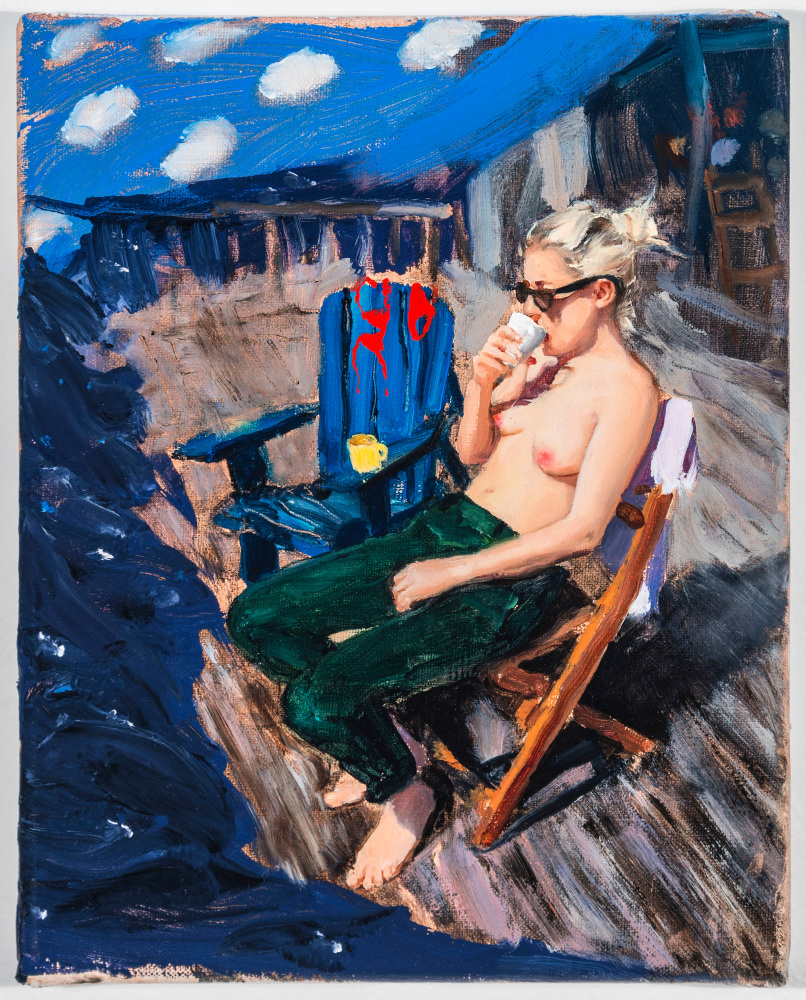
"Paint, also known as Blood" is the first large-scale international exhibition devoted to women whose painting practice re-evaluates stereotypes concerning submission and domination.
The title of the exhibition, borrowed from a book by a former hunter, Zenon Kruczyński, marks a perverse reference to a term popular in hunting jargon that stands for the blood of a hunted animal. However, the show does not tell a story of the subjugation of women. The invited artists propose an affirmative version of womanhood by endowing their bodies with agency, autonomy and power of self-determination. The eponymous paint becomes a visceral, sticky matter that leads us towards the point where all meanings collapse. It blurs the categories of power and objectification, thus provoking the question of when do we look, and when do we look away?
In the beginning of the 1990s, third-wave feminism introduced a new, sometimes self-mocking and ironic, unconstrained and exhibitionist tone in the debate on the images of women in culture, their social roles and desires, the physiology of their bodies, and identity. The exhibition demonstrates that — despite the advancing digitisation and dematerialisation occurring in social media —firmly embedded in the body, its pleasures, and traumas, painting remains an exceptionally evocative medium for representing human experience. Owing to its affective and performative nature, painting appears primarily as a leap into the subconscious and a practice that serves reflection on that which is repressed, perverse, embarrassing, prohibited.
Increasingly, contemporary women painters create private and introspection-based pieces saturated with disturbing sexuality; works that are sometimes obscene, audacious, and simultaneously not devoid of humour or grotesque. Affect serves the invited painters to reflect on an extraordinary, intricate network of meaning: excess and pleasure, but also the experience of violence, violence often characterised by ambiguity.
The exhibition presents the work of Polish artists in the broader context of international women’s painting, which takes on the challenge of representing the intensity of the external and internal worlds. The ‘monstrosity-mirrors’ — as Agata Bielik-Robson writes — become the ‘eye of the Gorgon. Something that simultaneously frightens, overwhelms, takes one’s breath away, but also summons, demands, interpellates.’ In the context of current social transformations, the postulates of equal access to reproductive and sexual rights, and the race and class struggles, women’s painting provides an important contemplation on the violence inscribed in the orders of seeing and consuming images — how we look at them, what we see, and how others see us. And yet, this is not the kind of painting that seeks to forcibly instruct, provide current affairs commentary, or to admonish. Rather, it calls for alternative scenarios and, most of all, the freedom of expression and the presence of multiple, intersecting identities.
Artists:
Lena Achtelik, Darja Bajagić, Gosia Bartosik, Kamilla Bischof, Agata Bogacka, Martyna Borowiecka, Agnieszka Brzeżańska, Chelsea Culprit, Martyna Czech, Olga Dmowska, Angela Dufresne, Isabelle Fein, Viola Głowacka, Penny Goring, Jenna Gribbon, Hyon Gyon, Karolina Jabłońska, Katarina Janeckova, Cheyenne Julien, Ewa Juszkiewicz, Celina Kanunnikava, Irini Karayannopoulou, Allison Katz, Simone Kennedy Doig, Caitlin Keogh, Stanislava Kovalcikova, Dominika Kowynia, Sarah Księska, Katarzyna Kukuła, Agata Kus, Sasa Lubińska, Reba Maybury, Monika Misztal, Magdalena Moskwa, Marta Nadolle, Paulina Ołowska, Julia Poziomecka, Christina Quarles, Autumn Ramsey, Megan Rooney, Dana Schutz, Tschabalala Self, Agata Słowak, Paulina Stasik, Frieda Toranzo Jaeger, Alex Urban, Aleksandra Waliszewska, Ambera Wellmann, Issy Wood, Amelie von Wulffen